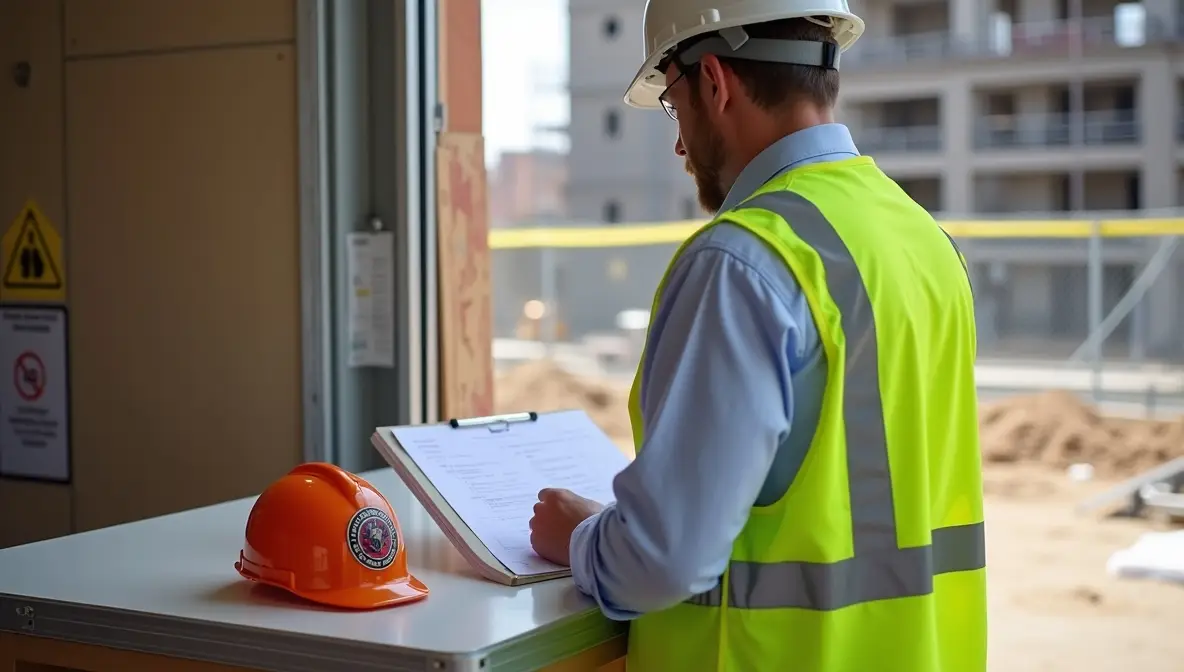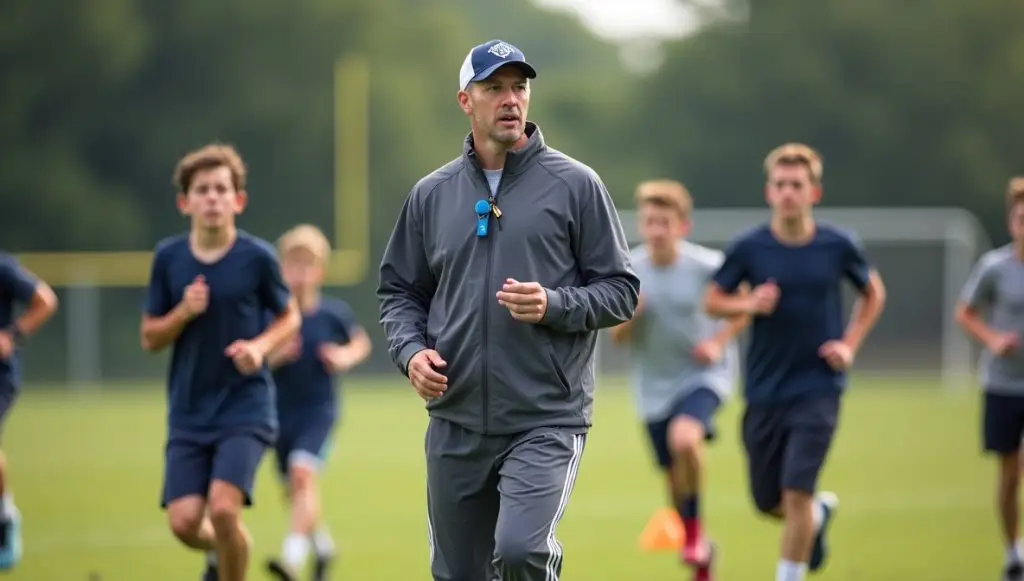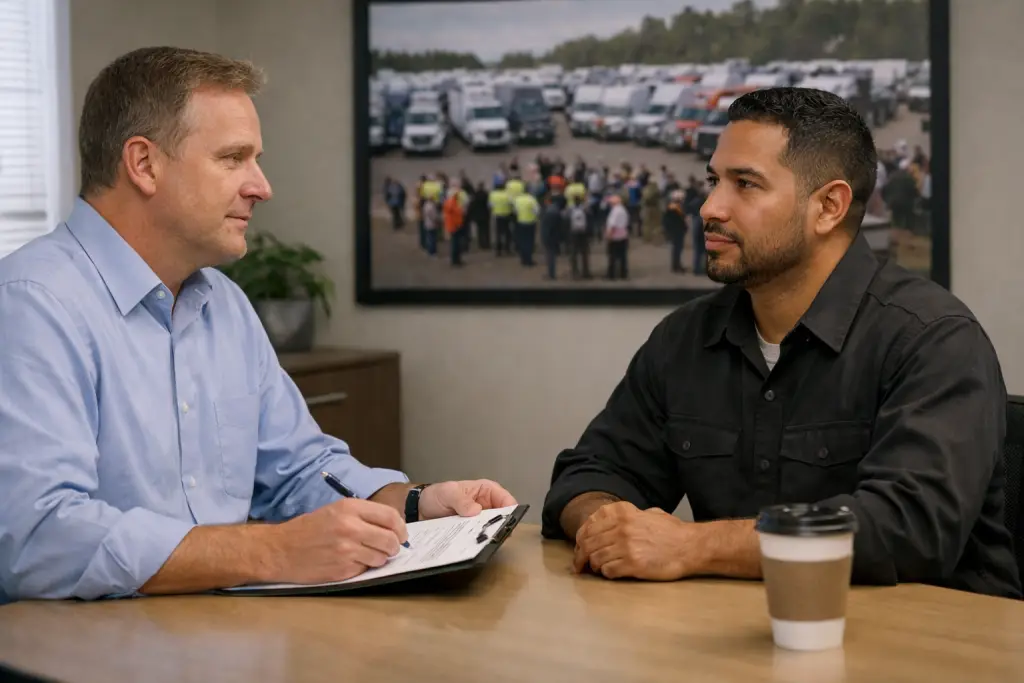New York construction background checks are governed by stringent Labor Law Article 8 requirements for projects over $250,000 and Department of State licensing protocols that demand comprehensive screening of criminal history, professional licenses, and employment records. These mandatory compliance measures ensure workplace safety while protecting both employers and workers through FCRA-compliant processes.
Key Takeaways
- Mandatory compliance with Labor Law Article 8 and DOS licensing requirements is non-negotiable for construction projects exceeding $250,000 in both public and private sectors.
- Comprehensive screening must include criminal history verification, professional license validation, and employment record checks across state and federal databases.
- FCRA compliance requires written disclosure, explicit consent, and proper adverse action procedures when background check findings affect hiring decisions.
- Industry-specific requirements vary by trade, with electricians, plumbers, and contractors needing additional certifications and union coordination protocols.
- Cost-benefit analysis shows thorough background checks ($30-$100 per screening) prevent significantly higher costs from safety violations, project delays, and liability issues.
- Digital verification systems are streamlining processes while maintaining data security standards and regulatory compliance across construction hiring workflows.
Introduction
New York's construction industry employs over 400,000 workers across countless projects, making rigorous background screening essential for maintaining safety and legal compliance. The state's regulatory framework combines Labor Law Article 8 provisions with Department of State licensing requirements to create comprehensive oversight. Understanding these background check requirements protects both employers and job seekers while ensuring construction sites meet the highest safety standards. This guide provides practical insights into triggers, processes, and compliance strategies for navigating New York construction background screening successfully.
Understanding New York Construction Background Check Requirements
New York construction background checks operate under specific regulatory triggers that determine when comprehensive screening becomes mandatory. Labor Law Article 8 applies to construction projects exceeding $250,000, encompassing both public works and private developments that utilize state funding. This threshold ensures substantial projects receive appropriate oversight while maintaining proportional regulatory burden.
Department of State licensing applications trigger background checks during initial license issuance, renewal processes, and corporate structure modifications. Any significant changes to business operations, ownership, or scope of work necessitate updated screening protocols. Municipal permit applications in major cities like New York City require background verification for substantial construction activities, including new construction, demolition projects, and specialty certification work.
Key Regulatory Triggers:
- Project value threshold: $250,000+ for Labor Law Article 8 compliance
- Licensing events: New applications, renewals, corporate changes
- Municipal permits: Major construction activities in regulated jurisdictions
- Public works: All state-funded construction projects regardless of size
- Specialty trades: Additional requirements for electrical, plumbing, HVAC work
These regulatory checkpoints ensure every construction worker has undergone proper vetting before accessing job sites. Compliance failures can result in project shutdowns, financial penalties, and licensing revocation.
Labor Law Article 8 Compliance Framework
Labor Law Article 8 establishes New York's prevailing wage requirements and worker verification standards for significant construction projects. This legislation originated to ensure fair compensation and skilled labor participation in public works while maintaining comprehensive safety oversight.
Projects subject to Article 8 typically involve public infrastructure, state-funded developments, or private projects utilizing government incentives. Employers must conduct thorough pre-employment screenings as part of their legal obligations, not merely as recommended practice. Ongoing monitoring throughout project duration ensures continued compliance and worker eligibility.
Article 8 Employer Responsibilities:
- Pre-employment screening: Criminal history, license verification, employment records
- Documentation maintenance: Accurate records for audit defense and compliance verification
- Ongoing monitoring: Continuous eligibility verification throughout project duration
Department of State Licensing Categories
The New York Department of State categorizes construction licenses based on work type and specialization requirements. General contracting, electrical work, plumbing, and HVAC each carry distinct licensing categories with specific background check components.
| License Category | Background Check Components | Renewal Frequency |
| General Contractor | Criminal history, financial stability, employment verification | 3 years |
| Electrical | Criminal history, technical certification, safety record | 3 years |
| Plumbing | Criminal history, apprenticeship verification, code compliance | 3 years |
DOS licensing maintenance requires ongoing adherence to background check standards, particularly when business operations expand or modify significantly.
Key Components of Construction Background Screening
New York construction background screening encompasses multiple verification layers designed to ensure worker qualifications and site safety. Criminal history verification serves as the foundation, involving comprehensive searches across state and federal databases, public safety registries, and outstanding warrant systems. This process identifies legal issues that might impact an individual's ability to work safely and securely on construction sites.
Professional license verification confirms current licensing status, identifies any disciplinary actions, and ensures multi-state compliance for workers operating across jurisdictions. A civil engineer's license must remain valid not only in New York but also in neighboring states where project work may extend. Employment and reference verification provides crucial insights into past work performance, safety records, and technical competency in construction environments.
Essential Screening Components:
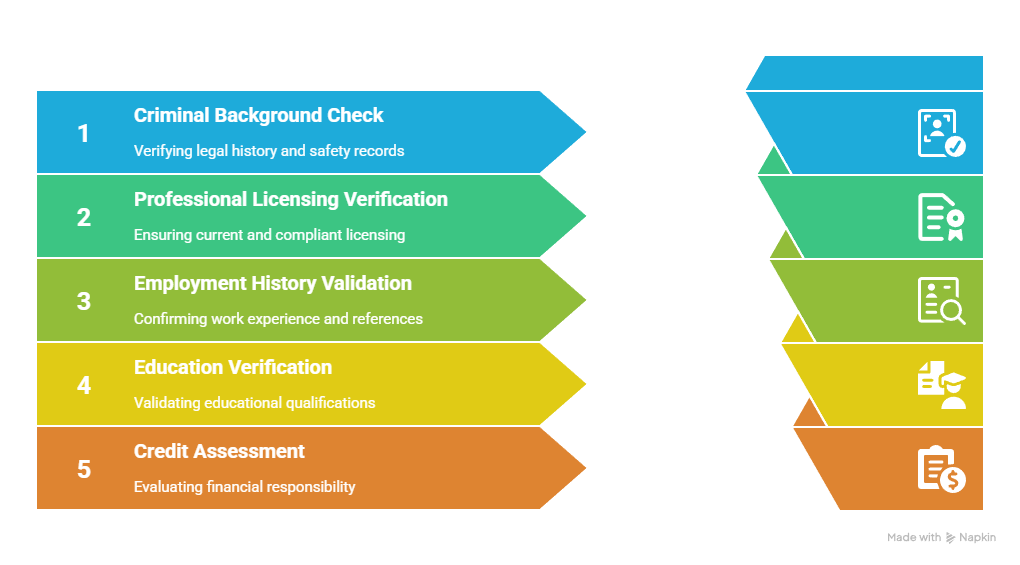
- Criminal background: State and federal database searches, warrant checks, public safety registries
- Professional licensing: Current status verification, disciplinary action review, multi-state compliance
- Employment history: Work experience validation, safety record examination, supervisor references
- Education verification: Technical training confirmation, certification program completion
- Credit assessment: Financial responsibility evaluation for positions involving monetary transactions
These comprehensive checks protect construction projects from hiring unqualified or potentially dangerous individuals while ensuring regulatory compliance.
Criminal History Verification Process
Criminal history verification in New York construction follows standardized protocols across state and federal databases. Searches encompass conviction records, pending charges, and outstanding warrants while excluding arrests that did not result in convictions per state Human Rights Law requirements.
Background check providers access New York State criminal databases, FBI national records, and specialized registries for sex offenders or violent crime perpetrators. The seven-year reporting limitation applies to most construction positions, though certain specialized roles may require extended historical review.
Professional License and Certification Checks
Professional license verification ensures construction workers maintain current, valid credentials for their specialized trades. This process includes confirming license status, reviewing disciplinary histories, and validating continuing education compliance.
Multi-state licensing verification becomes critical for construction companies operating across state lines or managing projects near jurisdictional boundaries. Interstate licensing agreements and reciprocity provisions affect verification requirements and timelines.
FCRA Compliance in Construction Background Checks
Fair Credit Reporting Act compliance forms the legal foundation for all New York construction background screening activities. FCRA requirements mandate written disclosure and explicit authorization before conducting any background investigation. Employers must provide clear notification about the screening process and obtain signed consent from applicants before proceeding.
Adverse action procedures require specific notifications when background check findings negatively impact hiring decisions. Applicants receive copies of background reports, summaries of their dispute rights, and opportunities to challenge inaccurate information. These protections ensure fairness while maintaining employer screening capabilities for safety-critical positions.
FCRA Compliance Requirements:
- Written disclosure: Clear notification of background check intent and scope
- Explicit authorization: Signed consent before screening commencement
- Adverse action notices: Required notifications when findings affect hiring decisions
- Report access: Applicant rights to review and dispute background check results
- Record retention: Documentation requirements for all screening communications
Proper FCRA compliance protects employers from legal liability while respecting applicant rights throughout the screening process. Non-compliance can result in significant financial penalties and legal exposure.
Disclosure and Authorization Requirements
FCRA disclosure requirements mandate standalone written notices that clearly explain the background check process, scope, and potential impact on employment decisions. These disclosures cannot be buried within employment applications or other documents but must appear as separate, prominent notifications.
Authorization forms require applicant signatures acknowledging consent to background screening activities. Electronic signatures are acceptable when properly implemented with appropriate verification and record-keeping systems.
Common Disqualifying Factors and Decision Criteria
Construction background check evaluations consider multiple factors when determining candidate suitability for safety-sensitive positions. Criminal history evaluation focuses on offense type, recency, and relevance to job responsibilities rather than blanket disqualifications. Violent crimes, theft-related offenses, and fraud typically raise significant concerns, particularly for recent occurrences within the past seven years.
Professional licensing issues create substantial obstacles to construction employment. Expired licenses, disciplinary actions, or failure to maintain continuing education requirements signal potential commitment issues or technical deficiencies. Employment history patterns revealing frequent job changes, unexplained gaps, or documented safety violations may indicate reliability concerns unsuitable for construction environments.
Primary Disqualifying Factors:
- Recent criminal convictions: Violent crimes, theft, fraud, drug-related offenses
- License deficiencies: Expired credentials, disciplinary actions, continuing education lapses
- Safety violations: Documented workplace accidents, OSHA citations, negligence incidents
- Employment instability: Frequent job changes, terminations for cause, unexplained gaps
- Financial issues: Bankruptcies, liens, judgments affecting positions with monetary responsibilities
Decision-making processes must balance safety requirements with fair hiring practices, considering rehabilitation evidence and time elapsed since negative events.
Criminal History Assessment Guidelines
Criminal history assessment in construction follows structured evaluation criteria that consider offense severity, time elapsed, and job relevance. Violent felonies and theft-related crimes receive heightened scrutiny due to construction site safety requirements and valuable equipment exposure.
| Offense Category | Evaluation Period | Risk Assessment |
| Violent Felonies | 10+ years | High scrutiny, case-by-case review |
| Property Crimes | 7 years | Moderate scrutiny, rehabilitation evidence |
| Drug Offenses | 5 years | Context-dependent, treatment completion |
Rehabilitation evidence, including treatment completion, steady employment, and community involvement, can influence hiring decisions for older offenses.
Industry-Specific Considerations and Union Requirements
New York construction industry background screening must account for union agreements and collective bargaining requirements that may impose additional screening protocols. Union membership often requires coordination between employer screening procedures and union standards to ensure compliance with both regulatory and contractual obligations. These dual requirements can create complex verification timelines but ultimately strengthen workforce quality.
Specialty trades carry unique background check requirements beyond standard construction screening. Electricians require additional safety certifications and technical competency verification due to high-voltage work hazards. Plumbers need state-specific licensing confirmation and specialized training documentation. HVAC technicians must demonstrate refrigerant handling certifications and environmental compliance training.
Trade-Specific Requirements:
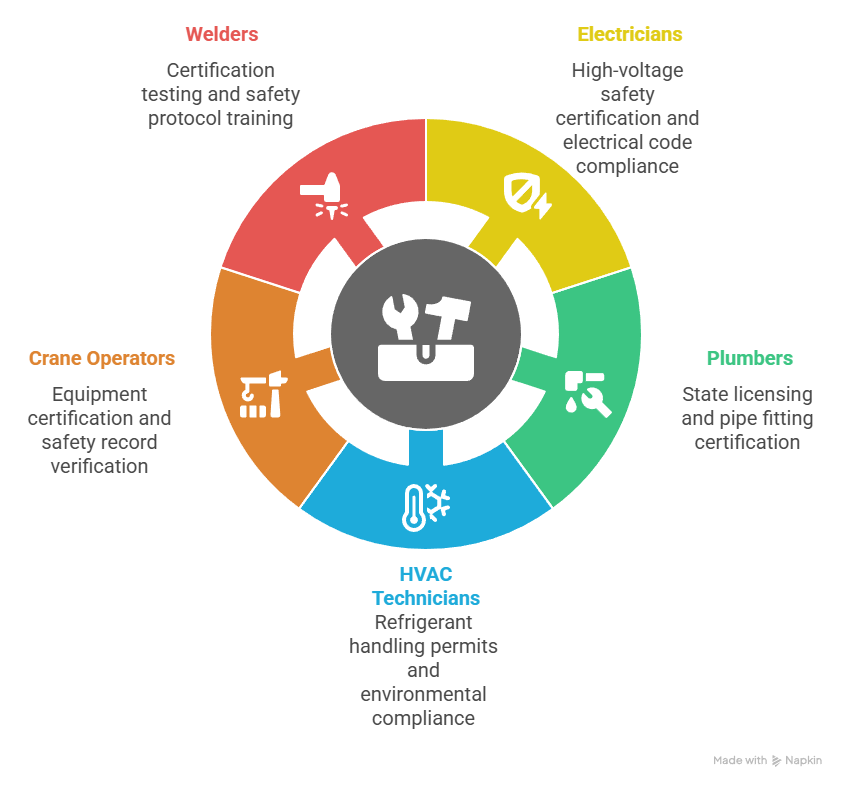
- Electricians: High-voltage safety certification, electrical code compliance, apprenticeship completion
- Plumbers: State licensing verification, pipe fitting certification, water safety training
- HVAC technicians: Refrigerant handling permits, environmental compliance, system-specific training
- Crane operators: Equipment certification, safety record verification, medical clearance documentation
- Welders: Certification testing, technique-specific qualifications, safety protocol training
These specialized requirements ensure tradespeople meet industry standards while maintaining construction site safety and regulatory compliance.
Union Coordination Protocols
Construction projects involving union labor create complex coordination requirements between employer screening standards and collective bargaining agreement provisions. Many union hiring halls maintain independent background check protocols that may supplement, modify, or replace standard employer verification procedures. These dual systems require careful navigation to ensure all parties meet their respective obligations.
Prevailing wage projects frequently mandate union participation, establishing overlapping oversight requirements for worker verification and eligibility determination. Coordination challenges arise when union standards differ from employer screening protocols or when timing requirements conflict between systems. Successful project management requires early communication between employers, unions, and screening providers to establish compatible verification timelines and standards.
Municipal Permit Requirements
Large construction projects in New York City and other major municipalities face additional background check requirements for permit approval and maintenance. These requirements often extend beyond individual worker screening to include contractor principals, project managers, and key personnel.
Municipal screening may include financial background investigations, business integrity evaluations, and previous project performance reviews. Permit maintenance requires ongoing compliance verification throughout project duration.
Technology and Digital Verification Solutions
Modern construction background screening increasingly relies on automated digital platforms that streamline verification processes while maintaining accuracy and compliance standards. These systems integrate multiple database sources, cross-reference information efficiently, and provide real-time updates on licensing status and criminal record changes. Digital platforms reduce processing times from weeks to days while minimizing human error in data collection and analysis.
Data security considerations become paramount when implementing digital background check solutions. FCRA-compliant platforms must encrypt sensitive personal information, restrict access to authorized personnel, and maintain audit trails for all screening activities. Cloud-based solutions offer scalability advantages but require robust security protocols to protect applicant privacy and comply with state data protection requirements.
Digital Platform Benefits:
- Processing speed: Automated database searches reduce verification timelines significantly
- Accuracy improvement: Cross-referencing multiple sources minimizes data entry errors
- Compliance tracking: Built-in FCRA protocols ensure proper disclosure and consent procedures
- Cost efficiency: Bulk screening capabilities reduce per-check expenses for large employers
- Real-time updates: Ongoing monitoring capabilities for license status and criminal record changes
Technology adoption in construction screening continues evolving rapidly, with artificial intelligence and machine learning enhancing decision-making accuracy while maintaining human oversight for complex cases.
Security and Compliance Standards
Digital background check platforms must meet stringent security standards to protect sensitive personal information during transmission, storage, and processing. Encryption protocols, access controls, and data retention policies ensure FCRA compliance while preventing unauthorized disclosure.
Regular security audits and compliance certifications validate platform integrity and regulatory adherence. Third-party security assessments provide additional verification of data protection capabilities and vulnerability management.
Cost Analysis and Budget Planning
Construction background check costs typically range from $30 to $100 per screening, depending on verification depth, number of databases searched, and specialized requirements for particular trades. Basic criminal history searches represent the lower cost range, while comprehensive screenings including credit checks, extensive employment verification, and multi-state licensing confirmation approach higher price points.
Cost-benefit analysis demonstrates that thorough background screening investments prevent significantly larger expenses associated with workplace accidents, safety violations, project delays, and potential litigation. A single safety incident or regulatory violation can cost thousands of dollars in fines, insurance claims, and project disruption, making comprehensive screening economically advantageous.
| Screening Type | Cost Range | Typical Components |
| Basic Criminal | $30-50 | State/federal databases, warrant check |
| Standard Construction | $50-75 | Criminal, employment, basic license verification |
| Comprehensive Trade | $75-100 | All components plus credit, multi-state licensing |
Bulk screening agreements and long-term provider relationships often reduce per-check costs while ensuring consistent service quality and compliance standards.
Return on Investment Considerations
Comprehensive background screening ROI extends beyond immediate hiring costs to encompass reduced liability exposure, improved safety records, and enhanced project completion rates. Companies with thorough screening programs typically experience fewer workplace incidents and maintain better insurance rates.
Long-term cost savings include reduced turnover, improved worker quality, and enhanced reputation for safety and reliability. These factors contribute to better project bidding opportunities and client relationships.
Best Practices for Employers and Implementation Strategies
Effective construction background screening requires well-defined policies that align with regulatory requirements while supporting efficient hiring processes. Screening policies should specify which positions require background checks, what verification components are necessary, and how results will be evaluated consistently. Regular policy reviews ensure continued compliance with evolving regulations and industry standards.
Provider selection significantly impacts screening program success and compliance. Employers should evaluate background check vendors based on FCRA compliance records, industry experience, technology capabilities, and customer service quality. Established providers with construction industry expertise understand trade-specific requirements and regulatory nuances better than generalist screening companies.
Implementation Best Practices:
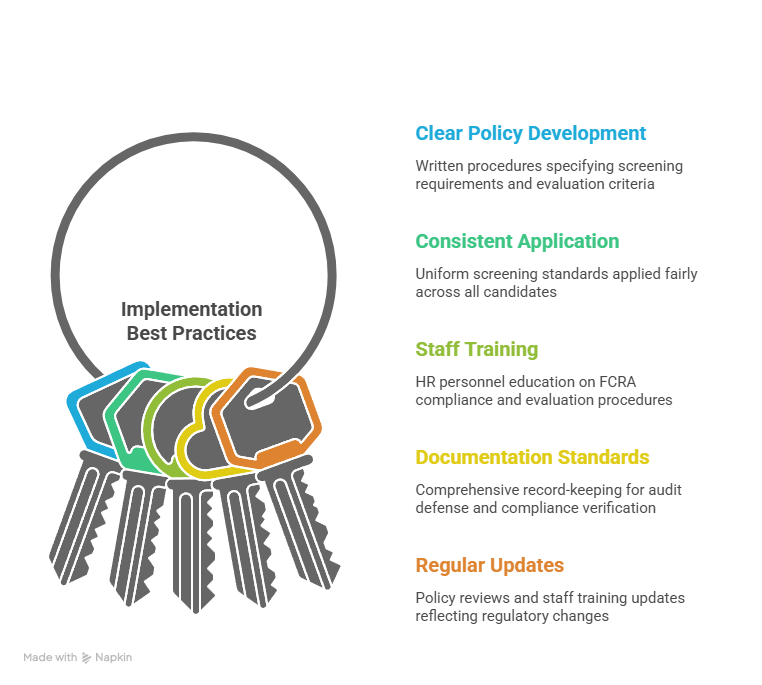
- Clear policy development: Written procedures specifying screening requirements and evaluation criteria
- Consistent application: Uniform screening standards applied fairly across all candidates
- Staff training: HR personnel education on FCRA compliance and evaluation procedures
- Documentation standards: Comprehensive record-keeping for audit defense and compliance verification
- Regular updates: Policy reviews and staff training updates reflecting regulatory changes
Staff training ensures proper implementation of screening procedures and maintains compliance throughout the hiring process. Regular training updates address regulatory changes and emerging best practices.
Documentation and Record-Keeping Requirements
Proper documentation serves as a crucial defense against potential disputes and regulatory audits. Employers must maintain records of screening authorizations, background check reports, decision-making rationale, and all communications with applicants regarding screening results.
Record retention periods vary by jurisdiction and screening type, but maintaining comprehensive documentation for at least seven years provides adequate protection. Digital record-keeping systems offer searchability and backup capabilities while ensuring proper access controls.
Future Trends and Regulatory Developments
New York construction background screening continues evolving with advancing technology and changing regulatory landscapes. Artificial intelligence integration promises faster, more accurate screening results while maintaining human oversight for complex decision-making. Real-time database updates and continuous monitoring capabilities may replace periodic re-screening requirements, providing ongoing verification of worker eligibility.
Privacy regulations are becoming increasingly stringent, with new requirements for data protection, consent management, and individual rights regarding personal information. The Fair Chance Act and similar "Ban the Box" legislation affects when and how criminal history inquiries can be conducted, requiring conditional job offers before background screening initiation.
Emerging Trends:
- AI-enhanced screening: Machine learning algorithms improving accuracy and speed
- Continuous monitoring: Real-time updates replacing periodic re-screening requirements
- Enhanced privacy protection: Stronger data protection requirements and individual rights
- Interstate licensing coordination: Improved reciprocity and verification across state lines
- Biometric verification: Advanced identity confirmation technologies
Employers must stay informed about regulatory changes and technology developments to maintain competitive advantages while ensuring continued compliance with evolving requirements.
Legislative Updates and Compliance Changes
Recent legislative developments include expanded background check requirements for construction workers in sensitive environments such as schools and healthcare facilities. New York State Senate Bill S2123 proposes additional screening mandates for contractors serving educational institutions and childcare facilities.
Municipal regulations continue expanding with new requirements for contractor registration, background verification, and ongoing compliance monitoring. Employers operating across multiple jurisdictions must track varying requirements and ensure comprehensive compliance.
Conclusion
New York construction background checks represent a critical component of industry safety and regulatory compliance, requiring thorough understanding of Labor Law Article 8, DOS licensing requirements, and FCRA obligations. Successful screening programs balance comprehensive verification with efficient processes, protecting both employers and workers while maintaining project schedules. Technology adoption and best practice implementation enable construction companies to navigate complex regulatory requirements while building qualified, trustworthy workforces. Staying current with evolving regulations and industry standards ensures continued compliance and competitive advantage in New York's dynamic construction market.
Frequently Asked Questions
What triggers background check requirements for New York construction projects?Â
Background checks are required for Labor Law Article 8 projects exceeding $250,000, Department of State licensing applications and renewals, and municipal permit applications for major construction activities. These triggers ensure comprehensive worker verification for significant construction projects across public and private sectors.
How long does the New York construction background check process typically take?Â
Standard construction background checks usually complete within 3-7 business days, though comprehensive screenings involving multiple database searches and license verifications may require 7-14 days. Digital platforms and automated systems are reducing processing times while maintaining accuracy and compliance standards.
What criminal history information can disqualify construction workers in New York?Â
Violent felonies, theft-related crimes, and fraud convictions typically raise significant concerns, particularly for recent offenses within seven years. However, New York follows individualized assessment requirements considering offense relevance, time elapsed, and rehabilitation evidence rather than blanket disqualifications.
Are construction employers required to provide background check results to applicants?Â
Yes, FCRA requirements mandate that employers provide copies of background reports and dispute right summaries when screening results negatively impact hiring decisions. Applicants have rights to review findings, challenge inaccuracies, and receive proper adverse action notifications.
Do union construction workers need separate background checks from employers?Â
Union workers may undergo screening through both union hiring halls and individual employers, depending on collective bargaining agreements and project requirements. Employers must coordinate with union standards while maintaining their own regulatory compliance obligations.
What documentation must employers maintain for construction background screening?Â
Employers must preserve screening authorizations, background reports, decision rationale, and all applicant communications for at least seven years. Comprehensive documentation serves as a crucial defense for potential disputes and regulatory audits.
How do New York's "Ban the Box" regulations affect construction hiring?Â
New York City's Fair Chance Act requires conditional job offers before conducting criminal background checks, preventing early elimination based on criminal history. This regulation supports fair hiring practices while maintaining employer screening capabilities for safety-sensitive positions.
What additional screening is required for specialized construction trades?Â
Electricians, plumbers, and HVAC technicians require trade-specific license verification, safety certification confirmation, and specialized training documentation beyond standard construction screening. These requirements ensure technical competency and regulatory compliance for specialized work.
Can construction workers dispute inaccurate background check information?Â
Absolutely. Workers have rights under FCRA to challenge incorrect information with background check providers, who must investigate disputes promptly and correct verified errors. Employers must consider corrected information when making final hiring decisions.
What are the typical costs for New York construction background checks?Â
Construction background screening costs range from $30-100 per check, depending on verification depth and specialized requirements. Comprehensive trade-specific screenings with multi-state licensing verification typically cost more than basic criminal history searches.
Additional Resources
- New York State Senate Bill S2123 - Construction Worker Background Check Requirements
https://www.nysenate.gov/legislation/bills/2025/S2123 - New York Department of State Construction Licensing Guide
https://www.dos.ny.gov/licensing/construction/ - Fair Credit Reporting Act Compliance Guidelines for Employers
https://www.ftc.gov/business-guidance/resources/using-consumer-reports-what-employers-need-know - New York State Labor Law Article 8 Full Text and Requirements
https://www.labor.ny.gov/workerprotection/laborstandards/article8/ - OSHA Construction Safety and Health Requirements
https://www.osha.gov/construction - New York City Fair Chance Act Implementation Guide
https://www1.nyc.gov/site/cchr/law/fair-chance-act.page - Construction Industry Background Screening Best Practices
https://www.napbs.com/industry-guidelines/construction - New York State Human Rights Law Employment Discrimination Protections
https://dhr.ny.gov/employment-discrimination

GCheck Editorial Team
Meet the GCheck Editorial Team, your trusted source for insightful and up-to-date information in the world of employment background checks. Committed to delivering the latest trends, best practices, and industry insights, our team is dedicated to keeping you informed.
With a passion for ensuring accuracy, compliance, and efficiency in background screening, we are your go-to experts in the field. Stay tuned for our comprehensive articles, guides, and analysis, designed to empower businesses and individuals with the knowledge they need to make informed decisions.
At GCheck, we're here to guide you through the complexities of background checks, every step of the way.
